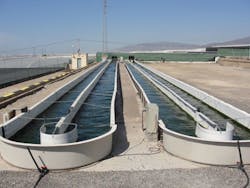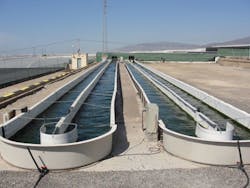The EU-backed All-gas project, in southern Spain, claimed to be the largest in the world to convert algae into energy using wastewater, has successfully grown its first crop of algae biomass at its site in Chiclana.
The project comprises a number of partners led by Spanish water company, aqualia. The UK’s Southampton University is also involved, as well as Germany’s Fraunhofer and Gesellschaft, as well as Austria’s BDI and the Netherlands’ Feyecon y Hygear.
All-gas was launched in May 2011 with the aim of reducing the inherent energy of the fertilizers required for algae production and has now completed its two year pilot phase, which was conducted in a 200 square meter facility.
The ultimate goal for the project is to implement a 10 hectare facility to house the full process chain, from growth to harvesting, while demonstrating sustainable algae culture ponds integrated with biomass separation.
According to aqualia, plans for the construction of the biomass plant are on schedule, and a one-hectare prototype is underway. The project’s final phase will span 10 hectares - equivalent to ten football fields.
| By 2016 it is hoped biofuel produced from the algae could power 200 vehicles |
How it works
To mitigate the energy impacts of fertilisers, algae at the facility are fed using nutrients from wastewater, which is treated by anaerobic digestion at the site. This recovers nutrients such as nitrogen and phosphorous, which are fed to the algae.
It is anticipated that once fully operational the facility will be capable of producing around 100 tonnes of algae per hectare per year. This will be achieved through the use of raceway ponds, coupled with simplified photobioreactors for innoculum production.
Alcohol, oils (which account for around 20% of the biomass) and other chemicals are extracted from the algae for downstream biofuel production. Biomass residues from these processes are also sent to the anaerobic digesters as feedstock.
CO2 emissions from electricity generation are also consumed by the algae, which leaves purified water ready for reuse.
Aqulia said the joint use of wastewater and biomass for algae cultivation turns two waste streams into a purified effluent for reuse, with biomass for energy production as a by-product - with minimal electrical input needed or residual sludge left.
First crop
According to the project partners, the algae crop has produced outstanding results, and the biomass obtained shows a particularly high energy potential relative to its digestibility level, with a methane production capacity of around 200 to 300 litres of gas per kg of biomass when processed by anaerobic digestion.
The microalgae is also said to allow the purification of wastewater to a high standard.
The partners added that while in New Mexico there is a 6 hectare biofuel site that utilizes algae, it uses artificial fertilizer not waste nutrients, in terms of surface area this will be the first project of this scale for the cultivation of algae into bioenergy using wastewater treatment, in the world.
It is expected that by 2016, the biofuel produced by the All-gas project will be enough to fuel 200 vehicles.
Once the demonstration phase is reached the biogas produced by the anaerobic digesters will be used to fuel public buses and refuse collection vehicles in the region of Cadiz.
The €12 million All-gas project has received €7.1 million of EU funding.
Read More
Could it Eliminate the Need for Wastewater Aeration?
Algal blooms have always proved a challenge for the water industry. Yet could this organic matter,with the help of wastewater nutrients, be turned into a biofuel and help alleviate fossil fuel shortages? Tom Freyberg investigates the European funded All-Gas project.





